#those kids are arguably one of the redeeming elements of the show. like the acting is really good tho all things considered
Explore tagged Tumblr posts
Text
”oh boo hoo annabeth is still black in the show (even though it’s been like 2 years since the initial announcement)! wahh why can’t we just have book accurate—“
the show is badly written. the show is badly written! it just is! they replace important book moments with weird new ideas that don’t quite pan out, it’s shallow, the dialogue is weird, the characters are flat. it’s very rushed, with stakes built up to an anticlimax. it arguably doesn’t retain any of the previous themes that the books did. it’s not a good adaptation. a 12 year old black girl trying her best despite the writing she was given is not to blame. if you’re gonna complain about the show (as you should), at least do it right.
#pjo show crit#pjo#as a white person can y’all shut up please. like y’all are so annoying i feel like y’all care a lot more about being racist than—#book accuracy. bc i see all this stuff complaining about her#and those same people are just 😐 about the actual fucking elements of the show outside of the characters appearance#those kids are arguably one of the redeeming elements of the show. like the acting is really good tho all things considered
36 notes
·
View notes
Text
(kind of depressing) psychological analysis of jack atlas --involving ramen.
So, if youve watched YGO 5Ds entirely (meaning the subbed version as the dub never finishes the ending season) you’d have picked up on Jack’s obsession with instant cup ramen, which would be fine for any character really but it seems out of character for the pompous, upper-class (wannabe), arrogant luxurious Jack Atlas aka THE KING.
But actually it reveals a lot about him, and actually is really depressing... There is a massive link between ramen and his lost childhood.
In season 1 we see NO sign of this obsession or even care for ramen. The only thing he obsesses over to any degree is a) duelling Yusei to claim King b) saving Carly from the Dark Signers or arguably c) trying to figure out his own character as a king (after beaten by Yusei)
But, in Season 2 where he is (arguably...) “redeemed” from villain to teammate/rival, he gains a bit of comedic flare with his obsession with the cheap ramen cups. (and expensive posh coffee). The coffee obsession suits him. But cheap instant ramen?
His obsession starts Episode 80, where Lazar/Yaeger steals Team 5Ds’ engine programme as well as a cup of ramen. Jack’s reaction is... comedic?
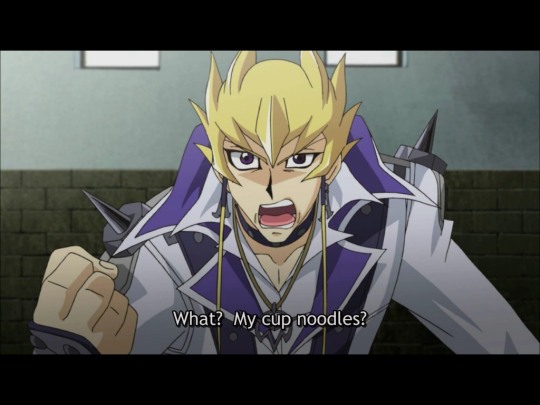
He’s more pissed at the fact his ramen was taken than the whole important, irreplaceable engine programme theft. Comedic. But his irritation at losing ramen continues in episodes 114-5, where again lazar/yager steals some ramen he wouldve bought and his reaction is...
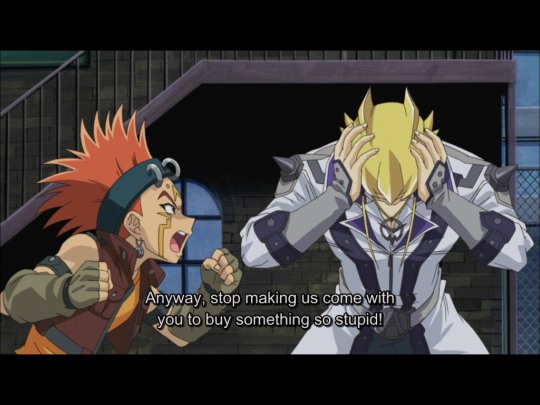
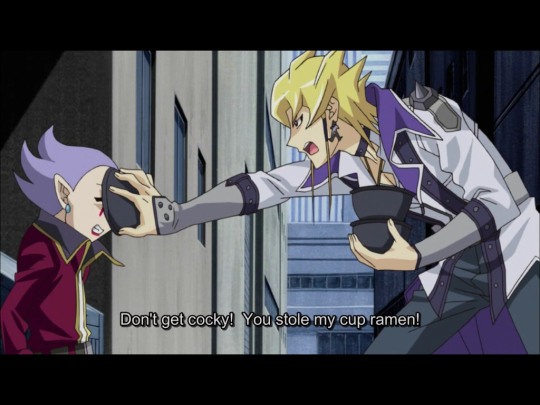
He is in total fear of just not having ramen. In fact, he even hoards it - shown in episode 115 where he brings it out to give to lazar.
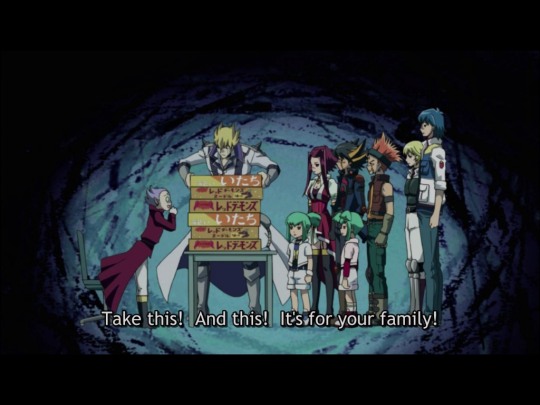
This is the episode that makes all this comedy turn dark and really depressing.

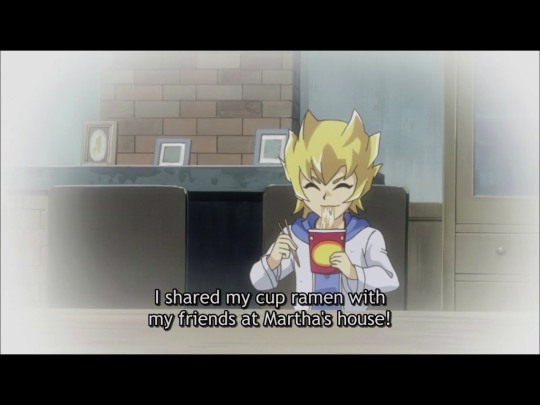
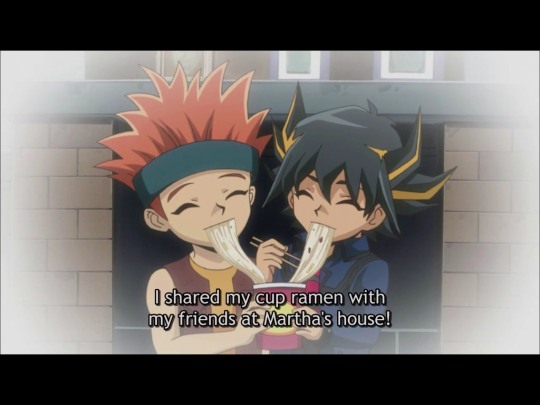
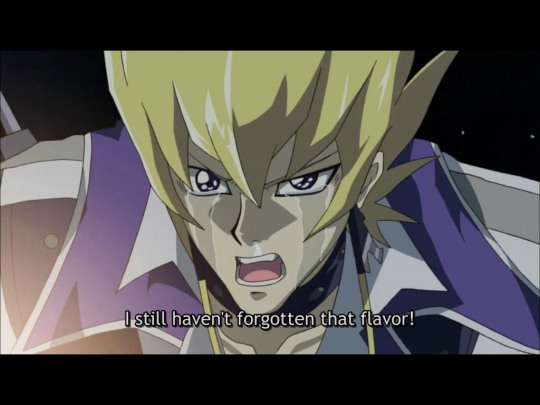
He reveals that the flavour of ramen reminds him of childhood at Martha’s, sharing it with Yusei, Crow, and the other orphans. This means that his obsession is like a psychological association to childhood, like sensory association, like how many people can recognise and get nostalgic over smells and tastes without even knowing why. Jack hoards and eats ramen defensively because he longs for childhood - whether its the relationship he had with friends or the carelessness of childhood, he misses it in comparison to adult life. I mean... who can blame him - theres a reason why so so so many conditions exist mentally that cause people to retract into childhood behaviours, like the whole AdultBaby lifestyle (wont get into it but the platonic side of it is a longing for childhood often lost) or where people continue hobbies such as certain toy collecting etc that they did as kids, OR that they longed to do as kids but just couldnt do for whatever reason/restriction.
he even wants recognition from Yusei for remembering that flavour/memory:
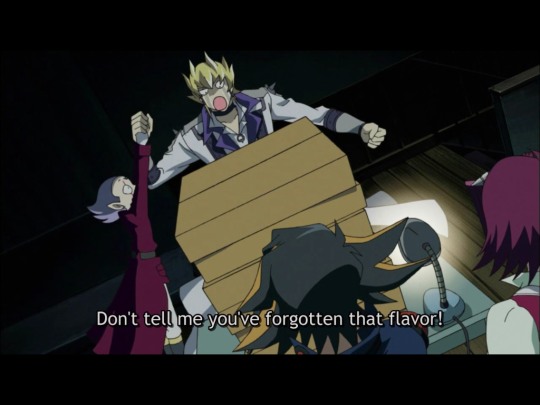
This is why he makes no mention of this in Season 1. Jack S1 was all about the present -no future nor past. He hated his past in Satellite w Yusei etc, openly wanting to ignore it, perhaps guilty for stealing Yusei’s card etc or overall hating that limited and depressive situation. (I have a headcanon Jack genuinely fell into a depression in Satellite and just acted to get out, but thats too deep for this current time lmao)
Because he didnt want ANY reminder of his past (hence hatred of Yusei, Crow, Kalin, and the entirety of Satellite, or “Satellite scum/trash” as he calls them in the dub), he doesnt want ramen.
But, S2, he is reformed and has his old friends back, and even martha has accepted him back. So, he realises the error of his ways, and reclines into his lost and mentally more stable childhood. Through ramen.
His childhood wasnt happier - satellite was at its worst, they were struggling, he had no freedom, in comparison to the S2 situation where he achieved duelling fame, has friends back, and satellite and Neo Domino are united (kinda)
BUT maybe he wants to go back and correct things? Or live a guilt-less and resent-less life again, not having done any wrong? I mean this is impossible to say, but clearly his ramen obsession, now being linked w childhood, means a longing to go back for some reason.
It’s clear he shows regret or sadness over childhood/lost childhood: the only time he cries in the show with tears are over memories from childhood with ramen;
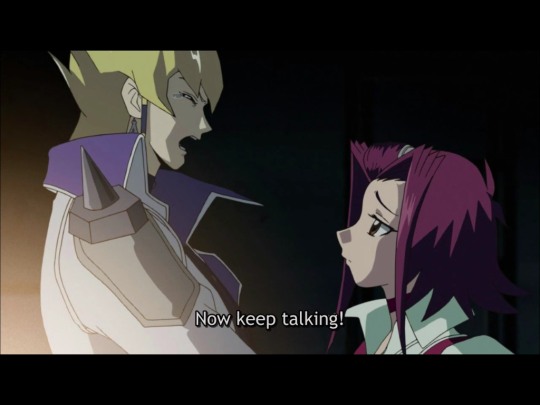
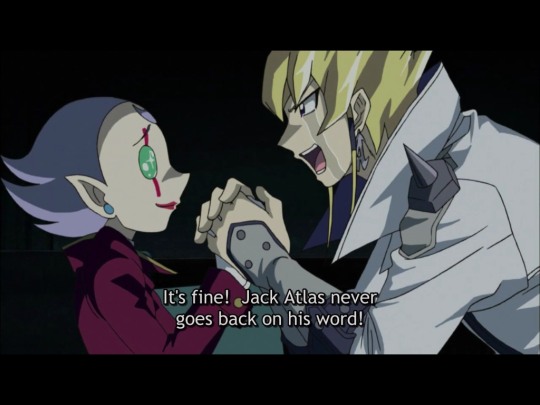
His face is streaming with tears because of Lazar’s story about ramen and childhood which he related to. He is SO intensely emotional over ramen that it does come of as comedic, which is really strange for the rival character as serious/uptight as jack. I mean, could you imagine Kaiba ever acting like this over, idk, cereal? maybe one time he shared a bowl of cornflakes with mokuba and now he cries every morning eating his cereal because of those memories. idk.
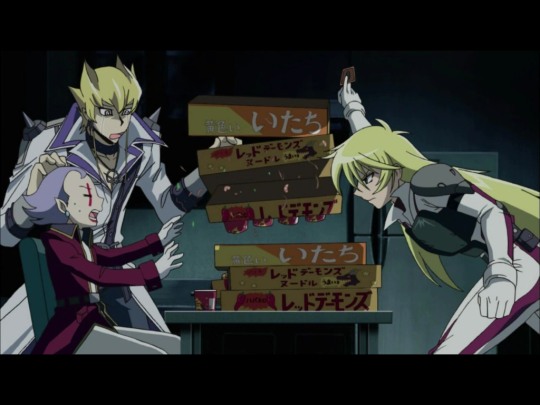
this is 115 when Sherry cuts the pile of ramen boxes out of impatience, Jack is IN HORROR of his prized collection being attacked like this. its like she’s cutting up his childhood memories or something. I mean, it basically is, apparently.
...
His comment to Crow summarises all this, 114. He has just screamed at Lazar for stealing “his” ramen (it was the old lady’s but ok jack) Crow asks him to calm down
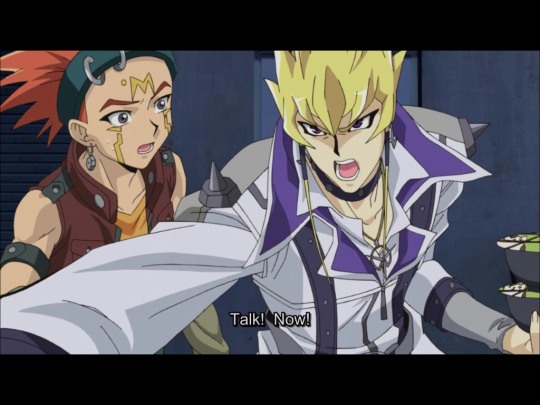
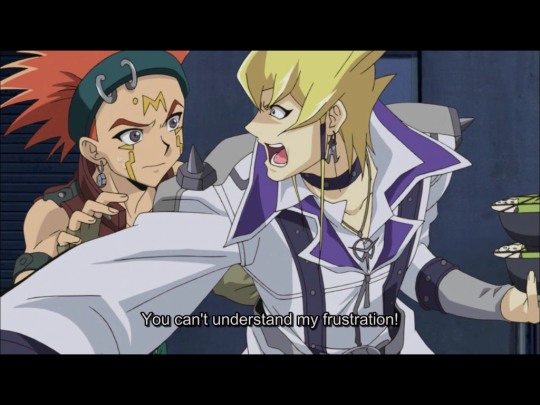
its right, he cant, no one can. Its something in his mind relating to his childhood, losing ramen or even being in a situation where his ramen might not be “his” safely, unsettles Jack. Ramen represents his childhood in some regard, and the anxiety of losing it causes him to become incredibly defensive and on edge.
-
im sorry for this random and kinda deep/depressing take on Jack. I know we should be thinking positive rn in the current global pandemic, but i just needed to get this analysis thing out there (more a rant actually) because it really struck me when S2 made jack have a weird “comedic” element about him, in his reformed state. It’s not so much comedic, but deep and suiting his character. His obsession over ramen is not just a gag to make him more like a good-guy now he is teammates with Crow and Yusei etc, but it develops his character and gives him reformation in a completely different sense -- it doesnt force his goodness out by just making him into a comedy-relief, but rather gives him emotional backing for his mistakes and wrongdoing in the previous season, and actusally makes it kind of depressing how he arrogantly tried to forget and destroy his past in Satellite with his friends.
gimme any thoughts you have on this, if you made it this far through the rant (i applaud and love you if you did!!)
i thought of all this because in the current global situation, most people are limited inside and getting depressing, sometimes its better to mentally retract and go back to better times when this whole thing wasnt going on, and for Jack that was childhood. Sorry for philosophical rant lol, at 1am in the morning for my part of the world~
here is funny pic to say sorry and lighten the mood~
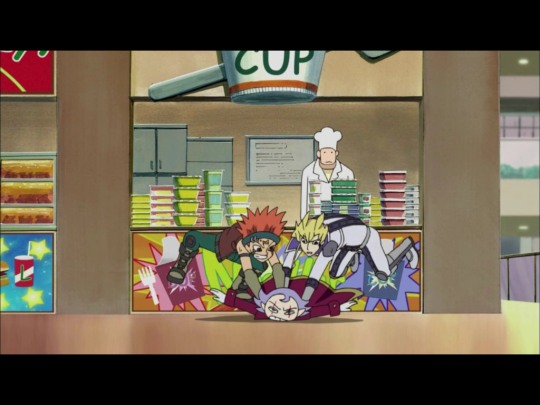
(that chef has seen some dark things in his life... )
#jack atlas#yugioh 5ds#yugioh#deep#character rant#im really sorry lol#ramen#cupramenshipping#there is a reason that exists eeeeee#psychology#have a good night as i wont now
268 notes
·
View notes
Text
How the writers have failed Roundhouse’s character
I’ve seen a fair bit of dislike towards Roundhouse and his character. I myself personally like Roundhouse, but I can definitely see the points of others, which I feel however can be put onto the blame of two factors that I will go through.
This is by no means trying to say that disliking the character is wrong, you can like or dislike any character you choose, but I feel that some of the reasons I will go over that be attributed to things outside of the in-world of the character.
Also new Twinkle chapter should be coming within the week, so if you’re following me for my fanfiction, have that to look forward to. <3
Anywho...
1. Development Roundhouse’s development throughout the first some issues is actually pretty good.
#20 they give you the idea that Roundhouse doesn’t belong. He looks unsuspecting, acts unsuspecting and everyone is sure to point it out. Robin and Red Arrow are immediately against him being on the team, and Robin only agreed because he wanted Kid Flash on the team and they were a ‘group deal’. Even when Roundhouse shows usefulness, like when he was able to get a potential lead towards who the ‘Other’ is, Robin pays him no mind, and he is visibly rattled by the explosion that follows. And then back at base, he is picked on by Crush, and has to get Wallace to back him up.
#21, he is easily deflected by Gizmo’s technology, all while rambling about social media and ‘Viewtube’, and once Gizmo is defeated by Djinn, he isn’t given an assignment by Robin who gives everyone else something to do. And then, when he joins the girls in getting the kids out of the store, he quite blatantly fails, leading him to ride on Crush’s and Djinn’s success. But he also shows intelligence, with quick thinking and a partial sacrifice leading him to save New York when he gets launched into space with a nuke. This is where he seemingly dies.
#22, He is thought to be dead, and yet Kid Flash is the only one mourning him. Crush is dismissive, Robin puts blame on himself because he “wasn’t ready”, and Red Arrow calls it an “inevitability” and turns his death into a training session.
#23, it’s revealed that he is alive and didn’t try to reach out to the team because he believed that no one would care... and because he was grounded. When he returns to the team, we quickly see just how ‘normal’ he is in comparison to the rest of them, with their parent situations each heavily complicated, further pushing the narrative that he’s just an average kid with the most abnormal thing he has is a strict mother.
#25, we get to see just how he lives the nuke in space, and how he gets back. His concussed self hallucinates his dead sister helping out of the situation he gets in, likely because she’s the one he loved the most and the one he sook guidance in when she was alive, as well as brief insight into himself.
#26, he actually gets trusted to do something by Robin, and not just anything, but hack into the Batcomputer. He shows both awe and fear of Batman in the process, and while hacking, he shows that while smart, he isn’t perfect, and causes an alarm. Then, when the supposed Batman comes to attack, he hides in fear and has to be saved by Robin.
#27, he brings Wallace home for dinner. And here, he displays even more elements of being just an average and awkward kid, like with how his mother acts, how he’s convinced her that Crush is his girlfriend(revealing his attraction to her), some bits of his early life and more, as well as more insight into how he feels about his sister’s death and his powers, how it makes him feel that she’s the one who died.
And from here, is when his pivotal plot commences. He discovers Robin’s underground prison, and based on factors to be revealed, he releases the inmates. It backfires, with the villains attacking him and his teammates and inadvertently causing the ‘death’ of Deathstroke.
We get more character tidbits, like on how willing he is to help his friends, even against a foe he is very outclassed by in Lobo, how he cares for them in the face of danger, having little care for his own safety as opposed to them, and even how Robin and Red Arrow still doubts him when it’s revealed there’s a traitor among their ranks, doubting that he’d be capable of something like this.
And then, #34, is when we get the big reveal. But not before we get even further insight into Roundhouse. Robin interrogates him, and while Roundhouse is lying about how he didn’t take Djinn’s ring, he still reveals information about himself and even breaks down Robin’s choice of interrogation, further showing his intelligence. His insecurities, his guilt over his sister dying, how hard he tries because he wants so badly to be a hero but isn’t sure if he’s right for it.
And #35, the high point of this development. It’s revealed to the team that Roundhouse is the traitor and here he breaks down his background and why he did it. How close he was to Claire, how he saw her die, how he saw Robin swing away. Where he’s coming from is wrong, but the points he makes against Robin are correct. What Robin was doing was horrible, and Roundhouse just wanted to expose him for the bad person he was.
But his emotions get the better of him. Robin says it himself, he’s acted out thanks to a lot of stress coming from an emotional state. But when he perceived Robin acting mightier than him, he struck out and trapped Djinn in her ring. When Crush breaks from her restraints in rage to try and kill him, he accepts it, saying he deserves it, and is only saved by the intervention of Lobo.
Afterwards, he expresses grief and regret over his actions, and wants to help the team secure Crush. But after he gets left behind, he escapes and goes back home, ‘quitting’ the team and delving even deeper into his insecurities. Like how his sister was always better than him at everything and how his family was just ‘stuck with him’. But his mother gives him comfort, saying that while Claire was smarter, he was always more sociable, always caring for others over him and always being so emotional, and convincing him to go back to his friends to right his wrong, in which he saves Red Arrow, Kid Flash and Crush from drowning.
Now, we’re finally at a point where we can get into his redemption, the most keypoint of a good character’s redemption at #38. And what we get? Roundhouse gives a speech about how people make mistakes and he makes his, but he wants to do good. And once the team finally beats the Other, Robin tells him that he doesn’t need to apologize. And the issues after, we never see Roundhouse do anything to try and redeem himself.
These issues should at least be partially dedicated to Roundhouse trying to make up for what he did, but instead, things go back to normal as though they never happened. This is a ridiculous failure on the part of the writers, as it robs that last part of development right from Roundhouse and leaves that sour taste in the mouth of fans who want to see this character who did a horrible thing make up for it.
Like, Roundhouse's character isn't complicated. He's a goofball that was forced into his powers at the cost of his sister, and so while he wants to do good, he's still unsure on if he should be a hero because he’s insecure as all hell and constantly makes errors. He’s an average kid that collects Supreme merch, plays Fortnite and binges anime. He tries, but he messes up, perhaps because he's not a natural hero and shouldn’t be. And as we saw, his emotions got the better of him, the grief over his sister’s death, the person he was the closest to all of his life, and he took it out on the closest face he could attach the incident to, further justified by Robin’s prison and brainwashing.
To have potential development for him trying to redeem himself in the face of those who may not trust him anymore reduced to one sappy speech and a "You don't need to apologize, we have all done bad things(not true)" is just a shame. And I get why they did it, because they wanted focus on the Djinn War and Robin's collapse, not on this side character, but you've written yourself in a position where things can't go back to normal and yet they wrote it like they could, with a snap. And now you make Roundhouse look like he doesn’t actually care for what happened, nor the team does because everyone’s acting buddy buddy with him again.
There have been examples of bad writing in this Teen Titans run from Glass, most specifically being the characterization of Robin, but also Emiko and Wallace, but the flubbing of Roundhouse’s character development is also a big point of it for me as well, because I came to enjoy the character reading through, but you completely cut short his redemption, leaving out arguably the most major part of one’s development.
And I had even thought that Roundhouse was going to die in #41, based on the solicitation for it reading: “But victory comes at a terrible cost — because one of the Teen Titans won’t be making it back!“
I’d be sad to see Roundhouse go, but his death/entrapment here, at the finale of the Djinn War, would at least be something redeeming, or an end to his character development. He was the one who trapped Djinn, and willing to do anything he can to save her and bring her back, he ultimately sacrifices himself for it to defeat Elias. This would fit his character, as he’s always felt guilty over being the one to survive the accident that gave him his powers over Claire and here, he’d be able to put them to use when he rights his wrong.
And while I can’t say I’m disappointed that Roundhouse didn’t die, it would’ve at least been something, instead of what we got.
2. Inconsistency
This one isn’t nearly as long as the other, or as convoluted, but there’s inconsistency with the character, and it comes down to Glass leaving the project and Thompson taking over. Say what you will about Glass, but I can believe that he had a vision in mind for what Roundhouse’s character was, and he never quite broke it while writing. But now, Robbie Thompson has taken over, And we are getting new flashes of Roundhouse.
Roundhouse is now making references, to TMNT, to Supernatural, to whatever he can. Which is fine, ok, he’s a nerd. But when we get further in, suddenly, Roundhouse is the one that trusts Robin the most. Which is ridiculous. He gets told that Robin killed Brother Blood, and yet out of everyone, HE’S the one who doubts it, and then feels betrayed when it turns out it’s true. If anything, he should feel like he was in the right for believing Robin to be bad. He says Robin’s ruined the Teen Titans, which was already ruined when they broke up and when Roundhouse said that he himself ruined the team. Like, are you serious? Robin crossed a line, but as others have said, he’s just being hypocritical.
And him giving these speeches about being good just doesn’t work with the above mentioned, being a proper redemption to his story, as opposed to just skipping over that part of the story. What has he actually done to make up for what he did, besides help the team? Nothing, and that’s unforgivable. He talks about wanting to make up for things, but he never actually does.
And that’s that. I doubt many people will read this, but this is just my two cents on how the writers have ultimately failed Roundhouse’s development, and likely cemented him as someone that most fans will dislike for a long time, if not forever, because of it.
#roundhouse#billy wu#teen titans#damian wayne#robin#emiko queen#red arrow#kid flash#wallace west#djinn#xiomara rojas#crush
20 notes
·
View notes
Text
About Slytherin
People don’t talk about Hogwarts Houses all that much anymore, and for good reason. Between what we know about the author, the quality of the recent movies, the allegations against these movies’s biggest star (to be clear: I’m not taking sides on Depp/Hearst before the court case is resolved, and I reserve the right to not take sides afterwards either), it’s not exactly been fun to be a Harry Potter fan, and many people have moved on.
But sometimes you still see folks declaring what Hogwarts House they’re in, or what they imagine as a headcanon for a fictional character they like. And fairly often, the answer for that is Slytherin, both for themselves and for heroic characters. But how accurate is that? And more to the point, what is Slytherin really about?
I’m sure there’s stuff on Pottermore about this, but who cares. Within the actual books, we get three competing definitions of Slytherin from various sources:
The official description, from the Sorting Hat
Its reputation
What its people are actually like, filtered through Harry’s point of view.
The Sorting Hat is, functionally, a school official, and presumably gives the description of Slytherin that he’s supposed to. This description lists several core attributes of the house: It’s racist, and people may be devious, but they are also clever, loyal and true friends. Also deeply racist. If you leave out the racism then this sounds nice, and those qualities (minus the obvious racism) is presumably what people mean when they call themselves Slytherin. But can we trust the nice parts of that description?
There are plenty of examples throughout all the books of wizarding society featuring heavy propaganda from official sources, and official descriptions being incomplete and inaccurate. So it is at least possible that the Sorting Hat is speaking pro-Slytherin propaganda. (And also anti-Hufflepuff, I mean, seriously)
Compare and contrast with the reputation the house has in the wizarding world, among people who probably know more about it than just whatever new synonyms the Sorting Hat came up with. This reputation is simple: People assume Slytherin is evil, because evil wizards, notably Voldemort, and followers of evil wizards, notably the death eaters, often come from it. Harry’s experience certainly doesn’t contradict that either; to him, Slytherin is the house where all the bullies come from, both amongst students and teachers. His views gradually start changing as we see more non-evil Slytherins, like Slughorn, and with the whole Snape redemption arc (which, to be honest, was not my favorite by a long shot). The end conclusion the books reach about Slytherin appears to be that they’re just misunderstood and unfairly ostracized.
That conclusion, and Snape’s whole redemption arc, which is central to it, sure is… something. Parts of it have the same energy as the common hot take we’re currently seeing everywhere that goes, “calling racism racist is just bullying and forces vulnerable people to become racist”. I did not like it then and like it even less now.
But no matter what you feel about this arc, it’s important to note that the bad things people are saying about Slytherin are all based in fact: Voldemort did go there, and everyone else we know who is in Slytherin was either a Death Eater or has parents who are Death Eaters. The main exception here is Slughorn, who is hardly a shining beacon of anti-Voldemort resistance.
This brings us to the final source of information we have: The people who go to and teach at Slytherin. Now, since the books are all from Harry’s point of view, we’re obviously getting only a limited glimpse into life at that high school dorm, which may not be representative. But it is the best thing we got. And based on that, we see roughly three different categories of people in Slytherin: The aristocrats, the professional bootlickers, and the social climbers.
The aristocrats are easy to define as Draco Malfoy: His father is a racist slave-owning rich and powerful aristocrat. Draco knows that he will become a racist slave-owning rich and powerful aristocrat himself, and he’s already acting like one. And he doesn’t appear to be an exception there. It is heavily implied that a lot of Death Eaters are very powerful people, and their kids all go to Slytherin.
The professional bootlickers are Crabbe and Goyle, but also Professor Slughorn. Here we get people who are part of the power structure, but not at the top. They follow the aristocrats because they hope to gain social status that way. Slughorn is definitely much nicer than Crabbe and Goyle about it, but his main redeeming quality is arguably that he also seeks to decorate himself with royalty from other houses. He’s still a strict follower.
Finally, we see Snape and Tom Riddle: Both are outsiders who don’t really fit into the aristocratic system, because of their social background that is judged unacceptable. But both of them resent their social backgrounds and are willing to work with the established aristocracy. And since they’re very good at it, the aristocrats let them, and in the case of Voldemort, even let him lead. The fact that there are two of them implies that this is not an accident; Slytherin is, to a certain extent, open to people who don’t fit into the aristocracy normally, as long as they’re willing and able to get the aristocrats what they want.
So based on that, what is Slytherin about? I would argue that it’s power. Where Gryffindor has heroism, Ravenclaw has knowledge and Hufflepuff has a belief in the fundamental fact that all wizarding people have equal value, Slytherin represents power. Specifically, the house Slytherin’s explicit in-universe purpose is to preserve and perpetuate an old, very stratified and aristocratic power structure within the wizarding world.
This is supported by a number of key attitudes among all Slytherins who we meet. For example, all Slytherins have a rather cynical outlook on human worth, and believe it is right and necessary to rank people. Even Slughorn, the token “nice” Slytherin, has clear ideas of who is the most important among his students and who doesn’t matter at all.
Slytherins also have a rather peculiar moral codex that again serves its power structure. The aristocrats very clearly believe that rules and laws should apply strictly to other people; and the bootlickers help enable them in whatever crimes they do. Among aristocrats, it seems like they are openly acknowledging their schemes to some extent.
Here is where we get back to what the Sorting Hat says: Friendship and loyalty are key Slytherin traits. Sounds nice, until you realize that they mean the loyalty that Crabbe and Goyle show towards Malfoy. Or the kind of friendship that in real life goes, “I won’t tell anyone about your tax evasion and I trust you won’t tell anyone about my affairs”.
The racism of Slytherin is not an incidental element to make Draco seem more evil, but rather an integral part of preserving these power structures as well. First, the belief that some people are naturally better than others is engrained in Slytherin culture anyway. But more importantly, it limits the pool of people who can get into the aristocratic system, and thus ensures that the few at the top stay few and have to share less wealth and resources. Plus, the racism also provides the ideological underpinning of the whole system. Crabbe and Goyle follow Malfoy in part because they’ll get some of his riches and glamour, but also because they believe that he has a right to be in power. He comes from an old family that always was in power, and they’ve been taught both at home and in school that having the right ancestors is super important.
Is some of this a stretch? Maybe. But maybe not. Hogwarts is, after all, a reflection of the outside world, and there are plenty of examples of similar more-or-less aristocratic school systems that seem to have been the inspiration for Slytherin. In the US, the term “trust fund babies” is very obvious. In the UK, the elite private schools like Eton that educate most top politicians, journalists and so on are also a clear analogue. Slytherin appears to be a critique of that.
Until it doesn’t anymore, of course, because Harry needs to get closure with the incel who once lusted after his mother or something. Not gonna lie, Deadly Hallows was weak as shit.
So yeah, Slytherin: Aristocratic, racist, all about keeping the guys in power there.
Does that mean it’s wrong to head canon either yourself or your favorite fictional characters as Slytherin? No, of course not. As long as you/they are openly racist, have a superiority complex and believe that inherited wealth and power is always a good thing, then it’s perfectly alright to have such head canons. If not, well, then it becomes a bit more difficult.
#harry potter#hogwarts#slytherin#i did basically the same post a few months back but framed it wrong and nobody read it#so this is me trying again
7 notes
·
View notes
Text
Three Houses’ writing is overrated but you probably knew that
I could write a detailed dissection of the game but I think the issues in the writing are a lot more apparent such as the way TWITD is implemented and the rushed plot in CF, but this post is more of an off-my-chest thing and maybe some minor nitpicks.
I just want to make it clear to those reading, I don’t stan any of the major characters in this game. I find all of them poorly written to some capacity, I’m lenient to Dimitri and Rhea but that is by virtue of the fact that they are much more tolerable than Edelgard and Claude. I don’t find the characters’ ideology particularly awe-inspiring or well thought out because that would require the writer’s to do research on socioeconomics. I’m not saying the writers should do it, I’m just saying you can’t expect me to buy into JRPG level of sociopolitical philosophy and think it’s a well-written thought piece.
Three Houses takes a lot of inspiration from FE4, and funnily enough, it also borrowed the glaring writing issues. This is going to piss a lot of people off, but FE4 is not a well-written game. Both games suffer undermining themes, fluctuating the power level of the villains when it’s convenient, pacing, and presentation. I wouldn’t have much of a gripe if the fanbase didn’t have a tendency to write long essays of how ‘deep’ or ‘nuanced’ it is. A common defense or a highlight I suppose is that both games are dark or have complicated themes, and yet, these themes are never really fleshed out well.
They tackle themes of classism, but crest and holy blood will always put people at an advantage. This isn’t even a perspective thing, but there will always be people born with advantages such as wealth, athleticism, beauty, and etc. It’s not fair, but there’s not much you can do about it. You can’t rule with Meritocracy and claim that it’s fair for all classes when it’s clear that some people are going to have an advantage. You can remove the nobles from power but you can’t stop them from educating and grooming their kids to become prime minister or a position of high power with the wealth they have. You can practice day and night to become the best opera singer out there but you’re always going to find unfair competition if you weren’t born with Dorathea’s beauty and natural singing voice.
They tackle themes of prejudice, but do these games even remember that half the time? I’m pretty lenient to the Loptry sect but the game does them no favors every time they twirl their evil mustache without anything redeemable. Claude insists on open borders with Almyra, but does that really inspire confidants when they’re often portrayed as barbaric. Even Cyril thinks Almyra is a shit hole.
Another thing I think is important to bring up is some technical aspect of writing, which is pacing, narrative structure, and presentation. These things are what separates reading a book or watching a movie from reading a Wikipedia page. They are arguably more important than story elements. I’d like to think of storytelling as a museum. Every work of art is an idea or a story element and the way they are displayed alongside the minimalist atmosphere acts as the pacing and presentation. A good writer would have the equivalent to a museum that enhances your experience and maybe even broaden your views a little bit. A bad writer is equivalent to a museum that flings its work of art in any direction and is generally unpleasant to be in. Using story elements and themes to excuse bad writing shows no respect for the art of storytelling and generally comes off as ignorant and pretentious. I mean, Fates had some pretty interesting ideas but no one is praising its writing.
That’s not to say that anyone isn’t allowed to enjoy these two games. After all, FE4 is my all-time favorite game. It’s just that I’m greatly annoyed when pretentious people jump through hoops to make the game’s writing seem like a masterpiece when it’s not.
3 notes
·
View notes
Text
I Like to Watch | The Walking Dead
by Don Hall
I have this great idea. At the end of Return of the King, following the battle to destroy Sauron, we follow Aragorn and Gandalf as they continue battle lesser evils in Middle Earth. You know, maybe like a Balrog with delusions of grandeur or an evil faction of dwarves. In the meantime, Sauron, instead of being destroyed, is held captive and we get to know him a little better. Maybe we extend the saga to show his backstory and exactly how he became evil?
Hell, we could milk the battles for years!
No?
How about this: a The Princess Bride follow-up wherein Count Rugen survives the sword fight between he and Inigo. Then, later, the two form a bond and travel the countryside looking wrongs to right.
NO?!
OK: After Luke Skywalker kills the Emperor and we spend three prequels on the backstories of both Vader (as a kid) and the Emperor (as a Senator), we jump forward in time. There is a new threat with a bad guy not quite as bad as Vader because he's so openly conflicted and kinda horny for the female Luke. Then, when things come to a head at the third sequel, we bring back the Emperor so we can kill him AGAIN!!
No. You're right. That is a shitty idea.
At the (long) tail-end of the pandemic, the rest of the 10th season of The Walking Dead resumed airing and I found myself undeniably un-inspired. I didn't really care much for The Whisperers and after they bumped Rick Grimes off and then carted him away on a helicopter, the show sort of fizzled. I couldn't figure out what was missing (besides Rick) so I decided to go back to the beginning and watch the whole thing again.
The zombie trope goes back a ways into horror history. The concept of the dead re-animating and going for our living throats has elements of the Golem, aspects of Frankenstein's Monster, and a historical basis in the slavery practices of the French in Haiti.
The zombie archetype, as it appeared in Haiti and mirrored the inhumanity that existed there from 1625 to around 1800, was a projection of the African slaves’ relentless misery and subjugation. Haitian slaves believed that dying would release them back to lan guinée, literally Guinea, or Africa in general, a kind of afterlife where they could be free. Though suicide was common among slaves, those who took their own lives wouldn’t be allowed to return to lan guinée. Instead, they’d be condemned to skulk the Hispaniola plantations for eternity, an undead slave at once denied their own bodies and yet trapped inside them—a soulless zombie.
In 1968, George Romero shot (on a budget of $114,000) what was originally entitled Night of the Flesh Eaters and later renamed Night of the Living Dead. He didn't refer to his walking dead as "zombies" but as "ghouls."
The grainy black and white film was far more than a gruesome horror flick—it was an allegory for the protests of both the Vietnam War and the riots of those fighting for Civil Rights. Later, his sequel of sorts, Dawn of the Dead, is another social satire disguised as gore flick with the zombies (he now called them zombies) acting as stand-ins for the suburban consumerist ethos. 1985's Day of the Dead is an allegory about the mindless authoritarianism of the military. Land of the Dead was a satire of class division; Diary of the Dead spoofed the age of blogging and YouTube.
What were the zombies? How did they come to be? Romero gives us a comet. A cosmic incident with no more explanation. This gives the satirical representation the foreground.
Along came more zombie apocalypse movies: Re-animator, Dead Alive, 28 Days Later. Certainly a lot more including Night of the Creeps and Zombie. In 2004, we get Zach Snyder's brilliant re-make of Dawn of the Dead. This list of the undead had as much in common with the classic atomic monsters as they did the dinosaurs in Jurassic Park—these ghouls were created by man. These were the inevitable result of humankind's hubris and god-complex. We created the end of the world and now must make sense of our creation.
In 2003, Robert Kirkman and Tony Moore co-created a long-running comic series published by Image Comics: The Walking Dead. In 2010, AMC picked up the comic for a television series of the same name and what set these zombies apart from the previous strain is that one didn't have to be bitten in order to turn. These zombies represented a natural human-wide disease that re-animated anyone who died. Like a bizarre metaphor for Purgatory, becoming undead was inevitable for all living people. This created a completely different dynamic for those surviving.
Which brings us up to speed.
I was hooked to TWD for the first four seasons. The conclusion of the Governor arc was satisfying and everything about the prison was exceptional but I was exhausted by the time they arrived at Terminus. The thing became taxing to follow and I believe I'd hit my limit. I dropped away until I was talking to a friend who loved the show and she told me that Negan was the best villain she'd ever seen.
I rejoined the Grimes Gang with Season 5. Terminus cannibals. Again, I got sucked in. The tragic end of Bob. The back-and-forth conflict of Gabriel. The whole Beth in the hospital with the corrupt cops was weak but that may have been because I don't find Beth remotely interesting. Then we get to Alexandria and the dynamic between the people so blind to the world that they're having cocktail parties and the group who have endured almost comical loss and tragedy makes for some excellent storytelling.
Then came Season 6, episode 4 He's Not Here.
Both loosely connected to the journey of our merry band yet set completely apart, this standalone episode finds us with Morgan (the extraordinary Lennie James) being brought back from the insanity he's afflicted with by Eastman (an equally wonderful John Carroll Lynch). Eastman slowly brings Morgan back from the edge.
A psychiatrist, Eastman tells the story of his prison practice. He explains that he has worked with over 800 incarcerated patients and only one was irredeemably evil. He tells him of that patient, Crighton Dallas Wilton. While a model prisoner in the eyes of the prison staff, Eastman saw Wilton for what he was, an evil, manipulative psychopath. When the time for Wilton's parole came up, Eastman was the one to interview him and it was here that Wilton realized that Eastman had seen through his facade and attempted to kill him.
Later, we find out exactly how evil Wilton was and how Eastman came to be who he is in this apocalyptic world.
This episode is beautifully done and, upon re-watching the whole thing all over again, stands out for one important aspect. Eastman tells us that in this world of heroes and villains surrounded by the undead, there is only one truly evil person to watch out for.
The Governor isn't evil. He's an asshole. An authoritarian. He's also insane from grief which has driven him to become a villain. He's no more or less brutal in many ways than Rick. The Terminus cannibals are likewise justified in their choices as sickening and horrifying as they may be.
Eastman is warning us of true evil on the horizon.
That evil is Negan.
From the moment we see him (Jeffrey Dean Morgan) and his barbed wire bat, Lucille, he is the embodiment of gleeful malevolence. He is brutal and he fucking loves it. He kills both Abraham and Glenn with such casual smug pleasure that the fact that he just offed a beloved character who has been on the journey since the second episode of the entire franchise only hurts more.
Negan is the anti-Rick. No conflict within himself, convinced that he is righteous in his path with so little regard for even his own Saviors (his 'relationship' to Dwight is a thing of remarkable cruelty). It isn't even the body count (both the Governor and the Terminus gang kill more onscreen) but his enjoyment in brutalizing people, teasing them into submission, then gutting them on the street is Hannibal Lecter territory.
Negan is the one truly evil man Eastman warns us about.
In my marathon from the start, I realized sometime during Season 8—I had no interest in seeing any more following Negan's defeat. Having seen the episodes before, I didn't want to see the character redeemed. I didn't want him to be at all relatable. I wanted Rick to kill him and for a sense of closure.
Now take a peek at Season 8. The writers wrote the end of the series in this one. The alliance of Alexandria, The Hilltop, and The Kingdom against The Saviors. Eugene finds his safe place and Gabriel struggles to redeem himself. Fucking Carl dies! Rick beats Negan one-on-one in a field and cuts his throat with a piece of stained glass. FINIS. OVER. DONE, for chrissakes.
Carl's death means nothing if the ending isn't peace. I'll be honest, the first time I watched Carl die, I didn't much care. He wasn't a heavy weight character in my mind. The second time, I bawled like a baby because, in a few weeks, I watched him go from scared kid in the camp when Rick (presumed dead) strolls in to the young man sparring with Negan. Carl's vision of Rick's future is the end. Except for the Negan part. FUCK THAT. Negan doesn't get to survive.uck that
Rick cuts his throat. He doesn't instruct Sadiq to save him. Negan dies. Maggie gets her revenge. Rick makes his "a better world" speech. Cut to black.
HBO’s Six Feet Under, The Sopranos, The Leftovers. All could have continued following their obvious and arguably brilliant endings but they didn’t. Game of Thrones could’ve just stopped as soon as the Night King is defeated but they couldn’t help themselves and tarnished the legacy of one of the most watched television series in history. I loved Lost all the way up until they explained everything poorly.
I get it. AMC needs the cash cow. Lots of people employed so they just have to continue the tale but, man, when you get to an ending that good, walk away.
0 notes